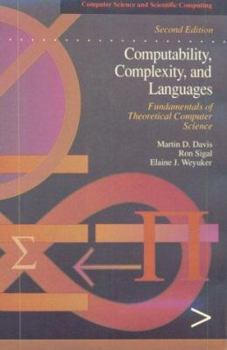Computability, Complexity, and Languages: Fundamentals of Theoretical Computer Science
Select Format
Select Condition 
Book Overview
The take-it-with-you collecting resource? At last, a guide you can really carry along to estate sales, garage sales, and flea markets, containing 1,000 color photographs and current pricing to make... This description may be from another edition of this product.
Format:Paperback
Language:English
ISBN:0122063821
ISBN13:9780122063824
Release Date:February 1994
Publisher:Morgan Kaufmann Publishers
Length:609 Pages
Weight:2.30 lbs.
Dimensions:1.9" x 6.4" x 9.3"
Customer Reviews
5 ratings
Pure mathematical view of Computability and Complexity
Published by Thriftbooks.com User , 22 years ago
This is not a common book on Computability and Complexity as Hopcroft-Ullman, Sipser or Papadimitrou. You won't find here too many words describing topics: you'll find the power and elegance of a superlative mathematical approach from one the best authors of the century in the field. Conversely, you'll find here a detailed and elegant treatment of the whole history of computational models that starts at the Primitive Recursive Functions, something you won't find in the other books above mentioned.A special note goes to the chapter on Blum's complexity, which is about the only good place where I found it and from where I studied for my course on Complexity I.For this reason the book requires quite more attention than others, but it really worths all the time one can spend reading it. Truly understanding Computability and Complexity as Professor Davis teaches them with this book is in my opinion a definitely high achievement, bringing the sensation that you grasp it totally, with no space for ambiguity or weakness.
Beautiful overview
Published by Thriftbooks.com User , 23 years ago
The authors of this book define theoretical computer science as the mathematical study of models of computation, and they do an excellent job of detailing the major results in the theory of computation as related to mathematical logic. Mathematicians, programmers, and philosophers will find the book an effective one in which to learn computability theory, and it serves well as a textbook for courses in the subject. After a brief review of elementary mathematics and mathematical logic in chapter 1, the authors move right into the consideration of computable functions in chapter 2. They choose a particular abstract programming language in which to study the computability theory, which is built from variables, and programs that can be built from lists of instructions. Examples of programs are given, which have a Fortran flavor, with examples of computing partial functions. Unfortunately, a plethora of GOTO statements appear in the programs, and throughout the rest of the book, which is surprising given the publishing date. The use of these GOTO statements in the book is a major annoyance. Then in chapter 3, the authors discuss primitive recursive functions, beginning with a treatment of composition, followed by the all-important concept of recursion. The class (PRC) of primitive recursive functions is introduced, and shown to be computable. The primitive recursive predicates are introduced, followed by a proof that the existential and universal quantifiers over an element of a PRC class are also PRC. This is followed by a discussion of minimalization and Godel numbers. The next chapter is very interesting, wherein the famous halting problem is discussed and related to Church's thesis. The authors stress, most importantly, that an algorithm cannot be defined outside of the choice of a language, and therefore Church's thesis cannot be proved as a theorem. The authors also introduce recursively enumerable sets and show, via diagonalization, that non-recursively enumerable sets exist. They give an interesting example of a function that is computable but not primitive recursive. The next chapter extends the results to strings of symbols instead of just numbers, and the authors introduce programming languages for doing string computations. One of these is the famous Post-Turing language, which they use to discuss the halting problem, with a variant used in the next chapter on Turing machines. The authors discuss the famous halting problem for Turing machines in this chapter. This is followed in chapter 7 by a discussion of productions and simulation of nondeterministic Turing machines. A very lucid treatment of Post's correspondence problem is given. Things get somewhat more complicated in chapter 8, where the authors attempt to classify unsolvable problems. It contains one of the best discussions I have seen in the literature on oracles, and the authors give a very clear treatment of arithmetic hierarchies. The second part of the book reads more li
My favorite book on the theory of computation
Published by Thriftbooks.com User , 24 years ago
I first learned computability from this book and I loved every minute of it. It has lots of material and is superbly written. In fact, I think the chapters on logic are the most painless way to learn that subject. There are many other books around on this subject, but this is the ultimate!
CS Theory at it's best
Published by Thriftbooks.com User , 24 years ago
I haven't found a better book on the Theoretical foundations of Computer Science. However since this IS theory the text can be a bit cryptic. Still, I'd recomend this book to any PhD Candidate or full Professor. Even a lowly Master's student like myself could use it.
This is a wonderful text about the theory of computation.
Published by Thriftbooks.com User , 25 years ago
It taught me how to think about the theory of computation. The exercises added to the second edition are a big improvement over the first editon.





